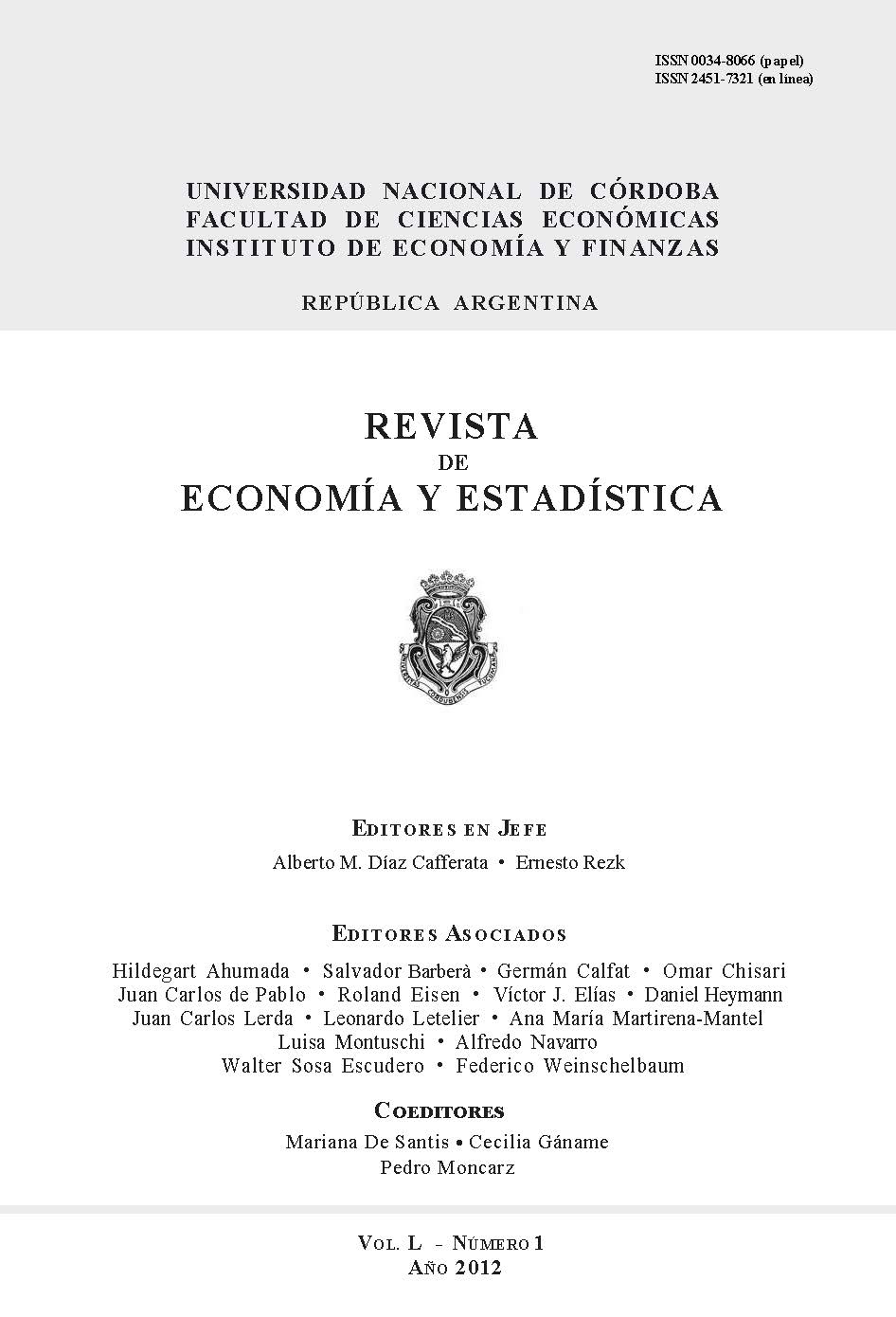Exports and Productivity: Does Destination Matter?
DOI:
https://doi.org/10.55444/2451.7321.2012.v50.n1.10250Keywords:
total factor productivity, exports, destination of exports, self- selection, learning by exportingAbstract
In this work, we analyze the effect of export destinations on Total Factor Productivity (TFP) of manufacturing Uruguayan firms for the period 1997-2006. We study two effects: self-selection and learning by exporting. There is evidence of self-selection with a stronger effect for firms exporting to developed countries. Nevertheless, applying transition groups methodology in order to mitigate endogeneity issues, there is no evidence that exporting to developed countries enhances productivity through learning by exporting. However, evidence of learning by exporting is found for those firms starting to export to less developed countries. These findings suggest an international strategy through which firms reach gains in productivity exporting to markets with lower entry cost, and once they have learned and improved their productivity, are in a better position to enter more developed countries.
Downloads
References
Aghion, P., R. Blundell, R. Griffith, P. Howitt, y S. Prantl., (2009). "The effects of entry on incumbent innovation and productivity", The Review of Economics and Statistics. 91 (1), pp. 20-32.
Alvarez, R., y R. A López., (2005). "Exporting and performance: evidence from Chilean plants". Canadian Journal of Economics/Revue canadienne d’économique. 38 (4), pp. 1384-1400.
Aw, B.Y. y Hwang, A.R., (1995). "Productivity and the export market: A firm-level analysis". Journal of Development Economics, 47(2), pp.313–332.
Bernard, A. B, y J. Bradford Jensen, (1999). "Exceptional exporter performance: cause, effect, or both?". Journal of International Economics. 47 (1) pp. 1-25.
Bernard, A.B. y Wagner, J., (1997). "Exports and success in German manufacturing". Review of World Economics, 133(1), pp.134–157.
Bittencourt, G., y M. Vaillant., (2001). "Oferta Exportable en el Uruguay. Empresas: ¿Quiénes venden?". Documento de trabajo, mimeo. Departamento de Economía, FCS, UDELAR, Montevideo.
Boermans, M. A., (2010). "Learning-by-Exporting and Destination Effects: Evidence from African SMEs", Applied Econometrics and International Development, 13 (2), pp. 149-168
Clerides, Sofronis K., Saul Lach, y James R. Tybout., (1998). "Is Learning by Exporting Important? Micro-Dynamic Evidence from Colombia, Mexico, and Morocco". Quarterly Journal of Economics 113 (3) pp. 903-47.
Da Costa Ferré, L., (2008). "Diferenciales de productividad según orientación exportadora de las empresas: ¿se cumple la autoselección y el aprendizaje?" Documento de Trabajo No. 07/08, Departamento de Economía, FCE, UdelaR.
De Loecker, J., (2007). "Do exports generate higher productivity? Evidence from Slovenia". Journal of International Economics 73 (1) pp. 69-98.
Delgado, M.A., Farinas, JC, Ruano, S. (2002). "Firm productivity and export markets: a non-parametric approach". Journal of International Economics, 57(2), pp. 397-422.
Eaton, J., S. Kortum, y F. Kramarz. (2008). "An anatomy of international trade: Evidence from French firms". National Bureau of Economic Research. NBER Working Paper No. 14610.
Fernandes, A.M., y A.E. Isgut., (2007). "Learning-by-Exporting Effects: Are They for Real?". MPRA Paper 3121, University Library of Munich, Germany.
Girma, S., D. Greenaway, y R. Kneller., (2004). "Entry to export markets and productivity: A microeconometric analysis of matched firms". Review of International Economics. 12 (5) pp. 855-66.
Granér, M., y A. Isaksson., (2009). "Firm Efficiency and the Destination of Exports: Evidence from Kenyan Plant-level Data".The Developing Economies. 47 (3) pp. 279-306.
Griffith, R., S. Redding, y J. Reenen., (2004). "Mapping the two faces of R&D: Productivity growth in a panel of OECD industries". Review of Economics and Statistics. 86 (4) pp. 883-95.
ISGEP, International Study Group on Exports and Productivity., (2008). "Understanding Cross-Country Differences in Exporter Premia: Comparable Evidence for 14 Countries". Review of World Economics. 144 (4) pp. 596-635.
Kraay, A., (1999). "Exports and economic performance: evidence from a panel of Chinese enterprises". Revue d’Economie du Developpement, 1(2), pp.183–207.
Levinsohn, J., y A. Petrin, (2003). "Estimating Production Functions Using Inputs to Control for Unobservables". Journal of Development Economics 70 pp. 317-41.
Mukim, M., (2011). "Does exporting increase productivity? Evidence from India". LSE working papers. Disponible en: http://personal.lse.ac.uk/mukim/mu kim_jmp.pdf.
Olley, S., y A. Pakes., (1996). "The dynamics of productivity in the telecommunications equipment industry". Econometrica. 64 (6) pp. 1263-97.
Peluffo A. (2008). "Trade and Technology Progress: An Analysis For Uruguay". Revista de Economía y Estadìstica, vol. XLVI, no. 2, pp. 103 - 139.
Pisu, M., (2008). "Export destinations and learning-by-exporting: Evidence from Belgium", Working Paper Research 140, National Bank of Belgium.
Trofimenko, Natalia., (2008). "Learning by Exporting: Does It Matter Where One Learns? Evidence from Colombian Manufacturing Firms". Economic Development and Cultural Change. 56 (4) pp. 871-94.
Verardi, Vincenzo, y Joachim Wagner., (2012). "Productivity Premia for German Manufacturing Firms Exporting to the Euro-Area and Beyond: First Evidence from Robust Fixed Effects Estimations". The World Economy. 35 pp. 694–712.
Wagner, J., (2007). "Exports and productivity: a survey of the evidence from firm-level data". The World Economy 30 (1) pp. 60-82.
Downloads
Published
How to Cite
Issue
Section
License
Copyright (c) 2012 Barboni, Nicolas Ferrari, Hanna Melgarejo, Adriana Peluffo

This work is licensed under a Creative Commons Attribution-NonCommercial-NoDerivatives 4.0 International License.
Authors who have publications with this journal agree to the following terms:
Authors retain their copyright and grant the journal the right of first publication of their work, which is simultaneously subject to the Creative Commons Attribution-NonCommercial-NoDerivatives 4.0 International License that allows third parties to share the work provided that its author and first publication in this journal are indicated.
Authors may adopt other non-exclusive licensing arrangements for distribution of the published version of the work (e.g. depositing it in an institutional telematic archive or publishing it in a monographic volume) as long as the initial publication in this journal is indicated.
Authors are allowed and encouraged to disseminate their work via the Internet (e.g. in institutional telematic archives or on their website) before and during the submission process, which can lead to interesting exchanges and increase citations of the published work. (See The Open Access Effect)









